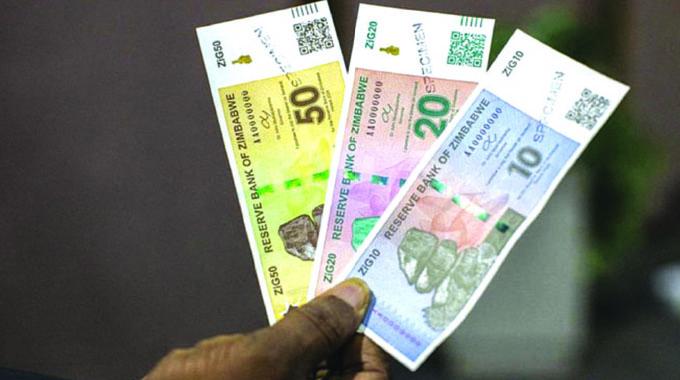News / National
Mnangagwa's govt paying lip service to ZWG
20 Sep 2024 at 07:02hrs |
1 Views

In a critical assessment of Zimbabwe Gold (ZWG), industry experts predict that the future post-mortem will reveal the government's own policies as the primary culprit behind the currency's struggles. Last week, the government announced a significant shift in its payment structure for wheat farmers, deciding to pay them solely in United States dollars after farmers protested against receiving partial payments in local currency.
Previously, farmers had received 75% of their payments in foreign currency, with the remaining 25% in Zimdollars, based on the prevailing interbank rate. This latest decision raises concerns that other sectors, including mining and exporting, may follow suit, completely bypassing the government's surrender rule, which mandates that companies sell 25% of their foreign earnings to the government at the interbank rate.
The government continues to owe numerous entities for foreign exchange purchased under the 25% surrender requirement. Now, this debt will be converted into a ZWG-denominated instrument with a one-year tenor, carrying an interest rate of 7.5% per annum.
Since its launch on April 5, the government's approach to promoting the ZWG has been lackluster. Initially, Reserve Bank of Zimbabwe (RBZ) governor John Mushayavanhu expressed optimism about the demand for ZWG, suggesting that companies would be eager to use it for tax obligations. However, a significant opportunity was missed when legislation requiring companies to pay half of their tax in local currency was not enacted by the second quarterly payment date on June 25.
Finance Minister Mthuli Ncube had indicated that companies would be required to pay half of their taxes in local currency, yet as the next payment period approaches, enabling legislation for the ZWG remains absent. Calls for the government to charge for services such as passport fees in local currency have also largely gone ignored.
At the unveiling of the ZWG, Mushayavanhu announced that the currency was backed by US$100 million in cash and 2,522 kg of gold valued at US$185 million, totaling US$285 million in support. However, reports suggest that the coverage for the currency has since quadrupled, raising questions about the sustainability of the ZWG.
Treasury Secretary George Guvamatanga recently informed President Emmerson Mnangagwa that the government has US$300 million held in private banks designated to support the local currency. Meanwhile, Mushayavanhu noted that foreign exchange reserves for the ZWG stand at US$370 million.
For the ZWG to succeed, experts insist that the government must take decisive action and genuinely commit to strengthening the local currency. Current indications suggest that the government is merely paying lip service to this cause, relegating the ZWG to a status of part-time legal tender and undermining its potential.
Previously, farmers had received 75% of their payments in foreign currency, with the remaining 25% in Zimdollars, based on the prevailing interbank rate. This latest decision raises concerns that other sectors, including mining and exporting, may follow suit, completely bypassing the government's surrender rule, which mandates that companies sell 25% of their foreign earnings to the government at the interbank rate.
The government continues to owe numerous entities for foreign exchange purchased under the 25% surrender requirement. Now, this debt will be converted into a ZWG-denominated instrument with a one-year tenor, carrying an interest rate of 7.5% per annum.
Since its launch on April 5, the government's approach to promoting the ZWG has been lackluster. Initially, Reserve Bank of Zimbabwe (RBZ) governor John Mushayavanhu expressed optimism about the demand for ZWG, suggesting that companies would be eager to use it for tax obligations. However, a significant opportunity was missed when legislation requiring companies to pay half of their tax in local currency was not enacted by the second quarterly payment date on June 25.
At the unveiling of the ZWG, Mushayavanhu announced that the currency was backed by US$100 million in cash and 2,522 kg of gold valued at US$185 million, totaling US$285 million in support. However, reports suggest that the coverage for the currency has since quadrupled, raising questions about the sustainability of the ZWG.
Treasury Secretary George Guvamatanga recently informed President Emmerson Mnangagwa that the government has US$300 million held in private banks designated to support the local currency. Meanwhile, Mushayavanhu noted that foreign exchange reserves for the ZWG stand at US$370 million.
For the ZWG to succeed, experts insist that the government must take decisive action and genuinely commit to strengthening the local currency. Current indications suggest that the government is merely paying lip service to this cause, relegating the ZWG to a status of part-time legal tender and undermining its potential.
Source - newsday
Join the discussion
Loading comments…




























